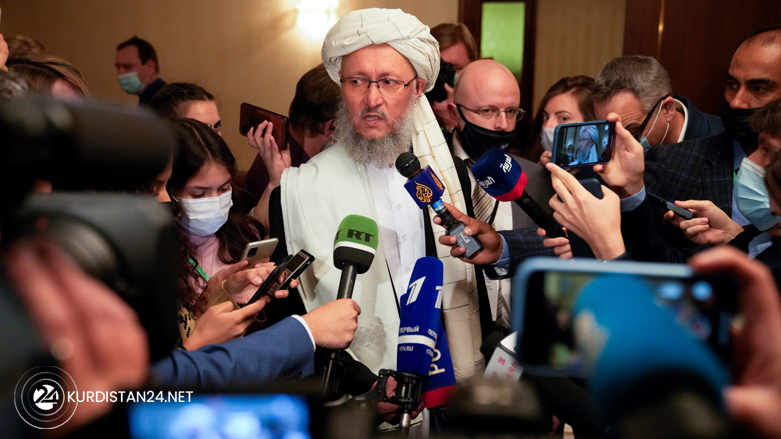Russia host Afghan talks, as it fills vacuum left by hasty US withdrawal

WASHINGTON DC (Kurdistan24) - Russia hosted international discussions on the future of Afghanistan on Tuesday and Wednesday, as it moves to fill the vacuum created by the chaotic US withdrawal from that country, which culminated in the fall of Kabul to the Taliban.
The US was invited to the meeting in Russia, but declined to attend for logistical reasons, even though it previously participated in the ‘Moscow Format’ discussions during the Trump administration.
The State Department said that it supports the negotiations, and it expects to attend such talks in the future.
The resignation of the US Special Representative for Afghan Reconciliation, Zalmay Khalilzad, was announced on Monday. He is to be replaced by his deputy, Tom West.
Khalilzad was previously US ambassador to Afghanistan (2004-5) and then to Iraq (2005-7.) The Afghan-born US diplomat has long been sympathetic to Kurdish political aspirations.
For example, writing in The Washington Post, from Erbil, on September 25, 2017, the day of the Kurdish independence referendum, Khalilzad cautioned against any party, including Baghdad, taking punitive action in response to the plebiscite.
“We have a long history of productive relations with the Kurds. They play a vital role in the continuing fight against the Islamic State,” Khalilzad wrote. “We enjoy a valuable intelligence relationship with them and benefit from access to military facilities in their region.”
“In addition, they are religiously tolerant, which is rare in the region, and have been welcoming of refugees and internally displaced persons,” he continued. “And, unlike in some other parts of the Middle East, the United States is loved and admired here.”
Khalilzad’s advice was not taken, unfortunately. Three weeks later, as Iraqi forces, under Iranian direction, assaulted the Kurds, the Trump administration closed its eyes and looked the other way.
Talks in Moscow
The first day of the Moscow Format conference began with discussions among the “extended troika”—i.e. the major powers: Russia and China, along with Pakistan. The US participated previously as part of the troika, while Pakistan is the main backer of the Taliban. In fact, many analysts regard the Taliban essentially as Pakistan’s proxy.
On the second day, the troika was joined by a Taliban delegation, as well as India, along with the Central Asian states of Kazakhstan and Kyrgyzstan, and those states bordering Afghanistan: Iran, Tajikistan, Turkmenistan, and Uzbekistan.
Russian Foreign Minister Sergey Lavrov called on the Taliban to prevent “the territory of Afghanistan from being used against the interests of any third countries, first and foremost, Afghanistan’s near neighbors—the Central Asian states, our friends and allies.”
Prior to the break-up of the Soviet Union in 1991, those countries were under Moscow’s rule. The Taliban victory in Kabul provides an opportunity for Russia to re-establish its influence over them.
Indeed, an informed adviser who has recently returned from a trip to Central Asia told Kurdistan 24, “The abrupt US withdrawal from Afghanistan has created a power vacuum in the region, which Russia is fast-filling,” while “the Chinese are not far behind.”
Terrorism and Opium: Two Dangerous Afghan Exports
The danger of terrorism in Afghanistan is now represented more by ISIS-K than al Qaida. The base of ISIS-K lies in eastern Afghanistan, in Nangarhar province. The base of the Taliban is in southern Afghanistan, in Kandahar.
Beyond that, there is little reliable information about ISIS-K, at least in the public record—although it is, perhaps, noteworthy that its leader, who goes by the nom de guerre Shahab al-Muhajir, is reportedly an Iraqi.
Omar Samad, a former Afghan ambassador to all of France, Canada, the European Union, and NATO made a similar point in speaking with Al-Jazeera on Saturday, as he explained that our understanding of ISIS-K was very limited.
Samad even hinted at the possibility that ISIS-K might have foreign support.
There are multiple “fault lines within Afghan society that any party—state or non-state actor”—could exploit, Samad said, as he stressed that we actually knew quite little about ISIS-K.
“Is it just a brand?,” Samad asked. “Or is there a program?”
The Taliban may not have the ability to counter ISIS-K, which has already conducted several high-profile assaults. They include the August 26 suicide bombing at Kabul airport, which killed 13 US troops and nearly 200 Afghans.
Most recently, ISIS-K bombed a Shi’ite mosque in Kandahar, killing some 50 Afghans. The week before, it bombed a Shi’ite mosque in the northern city of Kunduz, killing a similar number of people.
Although Russia stressed that the Taliban’s attendance at the conference did not constitute formal recognition of the group, it is not hard to see how the Taliban’s weakness in the face of ISIS-K’s terrorism could gain it international support, and eventual recognition, as it fights a terrorist group that is even more violent and vicious than it is.
The other challenge that Afghanistan presents to the world is its vast opium industry. Last year it produced an estimated 85% of the world’s opium—despite the fact that over the past 20 years, the US spent over $9 billion on counternarcotics programs in that country, as CNN reported.
Opium (like alcohol) is proscribed by Islamic law, and the new rulers of the Islamic Emirate of Afghanistan have said they will ban its production and trade.
When the Taliban first emerged in Afghanistan in 1994, they said the same thing, and to some extent, they actually did so. But the trade is extremely lucrative, and within a few years, the Taliban, too, began to exploit it.
There is, thus, little reason to believe that anything will be different this time, as a report from the Brookings Institution explains.
